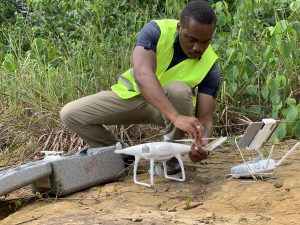After independent experts verified Gabon’s results from reduced deforestation and forest degradation (mainly from forestry activities), the payment of $17 million US dollars rewards Gabon’s reductions in 2016 and 2017, compared to annual emission levels from 2006 to 2015.
At a high-level event organised on Tuesday, Sveinung Rotevatn, Norway’s Minister of Climate and Environment said on behalf of CAFI:
“This is the first time an African country has been rewarded for reducing forest-related emissions at the national level. It is extremely important that Gabon has taken this first step. The country has demonstrated that with strong vision, dedication and drive, emissions reductions can be achieved in the Congo Basin forest.”
Gabon is leading the way in maintaining its status of High Forest Cover Low Deforestation (HFLD) country. The country’s forest management approach is science-based and robust. Despite low historical rates of deforestation and forest degradation, Gabon has been able to reduce CO2 emissions even further.
Being a low deforestation country means, however, that Gabon’s potential to reduce emissions is even more limited. Therefore, new mechanisms such as the ART-TREES HFLD methodology[1] are underway as incentives for HFLD countries to maintain low deforestation rates.
Gabon’s Minister of Water and Forests, the Seas, the Environment, charged with Climate Change and Land Use Planning, Professor Lee White said:
“This first payment of ODA financing, which is proportional to our historic emissions reductions in 2016 and 2017 at $5/ton, will finance projects that preserve Gabon’s forests. It also paves the way for Gabon to finalize the systems that will be required to enable the country to formally sell carbon credits in the future.”
“CAFI’s recognition of our systems and data is particularly encouraging in that they are a global reference on REDD+ payments. We are working with partners to develop payments mechanisms that will enable us to stabilize forests and reverse deforestation and forest degradation in HFLD countries, rather than simply slowing (=reducing) deforestation,” Professor White added.
Gabon and CAFI have agreed that this first payment will go towards activities that further decrease CO2 emissions through investments into community forestry, scientific research, forest management practices, protected areas system and government capacity, and that further enhance the income, livelihoods, and wellbeing of communities in Gabon.
Gabon has preserved much of its pristine rainforest since the early 2000s in creating 13 national parks, one of which is listed UNESCO World Heritage Site. Its forests absorb a total of 140 million tons of CO2 every year, the equivalent of removing 30 million cars from the road globally.
Gabon has also made significant advances in sustainable management of its timber resources outside the parks, with an ambition to ensure that all forest concessions are FSC-certified. Forest spans over 88% of its territory, and deforestation rates have been consistently low (less than 0.08%) since 1990. Gabon’s forests house pristine wildlife and megafauna including 60% of the remaining forest elephants, sometimes called the “architects” or “gardeners” of the forest for their roles in maintaining healthy ecosystems and recently listed as critically endangered.

Drone is used in the work of monitoring the rainforest in Gabon. Photo: Marte Lid / Norad
Media inquiries for Gabon
Gabon’s Minister of Water & Forests, the Seas, the Environment, charged with Climate Change & Land Use Planning, Professor Lee White is available for interview.
Ministry of Water & Forests, Seas and the Environment | Guilaine Nzogho Omanda
Press Officer | Call/WhatsApp +241 6240 39 44 or omanda.guilaine@gmail.com
Zebek Consulting | Abigail Stuart-Menteth | Call/WhatsApp/Telegram +44 7398 786 806 or abigail@zebek.co.uk
Media inquiries for Norway
Ministry of Climate and Environment | Gunhild Oland Santos-Nedrelid, Communications Officer
Call +47 951 64 906 or Gunhild-Oland.Santos-Nedrelid@kld.dep.no
Media inquiries for CAFI
United Nations Development Programme | Sarah Bel, Communications Specialist
Call +41 79 934 11 17 Sarah.Bel@undp.org
[1]ART approved TREDD+ Environmental Excellence Standard (TREES):
